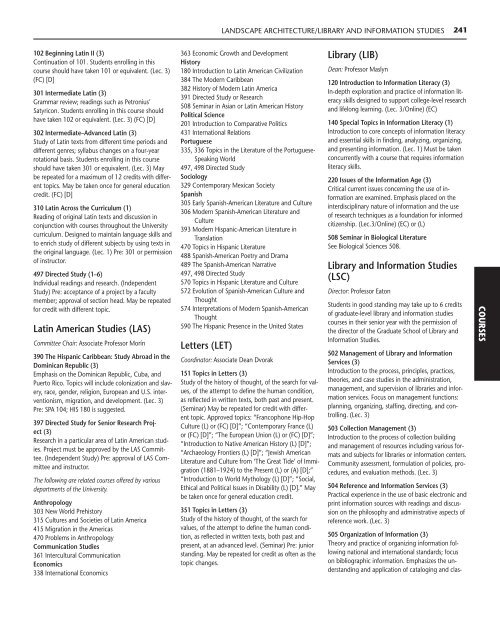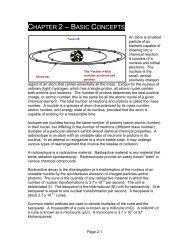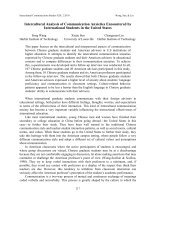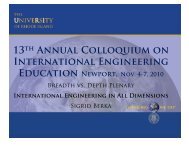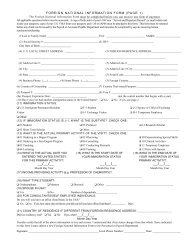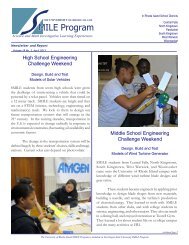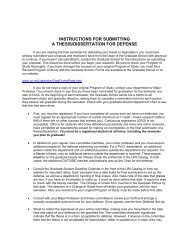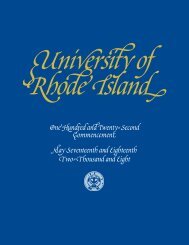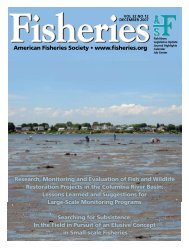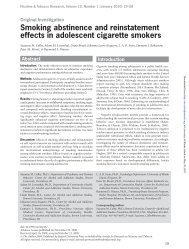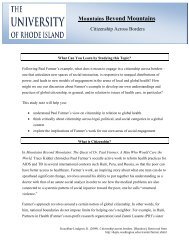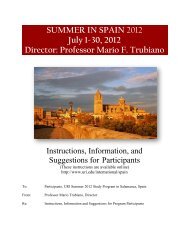UNDERGRADUATE PROGRAMS The - University of Rhode Island
UNDERGRADUATE PROGRAMS The - University of Rhode Island
UNDERGRADUATE PROGRAMS The - University of Rhode Island
Create successful ePaper yourself
Turn your PDF publications into a flip-book with our unique Google optimized e-Paper software.
102 Beginning Latin II (3)<br />
Continuation <strong>of</strong> 101. Students enrolling in this<br />
course should have taken 101 or equivalent. (Lec. 3)<br />
(FC) [D]<br />
301 Intermediate Latin (3)<br />
Grammar review; readings such as Petronius’<br />
Satyricon. Students enrolling in this course should<br />
have taken 102 or equivalent. (Lec. 3) (FC) [D]<br />
302 Intermediate–Advanced Latin (3)<br />
Study <strong>of</strong> Latin texts from different time periods and<br />
different genres; syllabus changes on a four-year<br />
rotational basis. Students enrolling in this course<br />
should have taken 301 or equivalent. (Lec. 3) May<br />
be repeated for a maximum <strong>of</strong> 12 credits with different<br />
topics. May be taken once for general education<br />
credit. (FC) [D]<br />
310 Latin Across the Curriculum (1)<br />
Reading <strong>of</strong> original Latin texts and discussion in<br />
conjunction with courses throughout the <strong>University</strong><br />
curriculum. Designed to maintain language skills and<br />
to enrich study <strong>of</strong> different subjects by using texts in<br />
the original language. (Lec. 1) Pre: 301 or permission<br />
<strong>of</strong> instructor.<br />
497 Directed Study (1–6)<br />
Individual readings and research. (Independent<br />
Study) Pre: acceptance <strong>of</strong> a project by a faculty<br />
member; approval <strong>of</strong> section head. May be repeated<br />
for credit with different topic.<br />
Latin American Studies (LAS)<br />
363 Economic Growth and Development<br />
History<br />
180 Introduction to Latin American Civilization<br />
384 <strong>The</strong> Modern Caribbean<br />
382 History <strong>of</strong> Modern Latin America<br />
391 Directed Study or Research<br />
508 Seminar in Asian or Latin American History<br />
Political Science<br />
201 Introduction to Comparative Politics<br />
431 International Relations<br />
Portuguese<br />
335, 336 Topics in the Literature <strong>of</strong> the Portuguese-<br />
Speaking World<br />
497, 498 Directed Study<br />
Sociology<br />
329 Contemporary Mexican Society<br />
Spanish<br />
305 Early Spanish-American Literature and Culture<br />
306 Modern Spanish-American Literature and<br />
Culture<br />
393 Modern Hispanic-American Literature in<br />
Translation<br />
470 Topics in Hispanic Literature<br />
488 Spanish-American Poetry and Drama<br />
489 <strong>The</strong> Spanish-American Narrative<br />
497, 498 Directed Study<br />
570 Topics in Hispanic Literature and Culture<br />
572 Evolution <strong>of</strong> Spanish-American Culture and<br />
Thought<br />
574 Interpretations <strong>of</strong> Modern Spanish-American<br />
Thought<br />
590 <strong>The</strong> Hispanic Presence in the United States<br />
Letters (LET)<br />
Committee Chair: Associate Pr<strong>of</strong>essor Morín<br />
390 <strong>The</strong> Hispanic Caribbean: Study Abroad in the<br />
Dominican Republic (3)<br />
Coordinator: Associate Dean Dvorak<br />
Emphasis on the Dominican Republic, Cuba, and 151 Topics in Letters (3)<br />
Puerto Rico. Topics will include colonization and slav- Study <strong>of</strong> the history <strong>of</strong> thought, <strong>of</strong> the search for valery,<br />
race, gender, religion, European and U.S. interues, <strong>of</strong> the attempt to define the human condition,<br />
ventionism, migration, and development. (Lec. 3) as reflected in written texts, both past and present.<br />
Pre: SPA 104; HIS 180 is suggested.<br />
(Seminar) May be repeated for credit with differ-<br />
397 Directed Study for Senior Research Project<br />
(3)<br />
Research in a particular area <strong>of</strong> Latin American studies.<br />
Project must be approved by the LAS Committee.<br />
(Independent Study) Pre: approval <strong>of</strong> LAS Committee<br />
and instructor.<br />
ent topic. Approved topics: “Francophone Hip-Hop<br />
Culture (L) or (FC) [D]”; “Contemporary France (L)<br />
or (FC) [D]”; “<strong>The</strong> European Union (L) or (FC) [D]”;<br />
“Introduction to Native American History (L) [D]”;<br />
“Archaeology Frontiers (L) [D]”; “Jewish American<br />
Literature and Culture from ‘<strong>The</strong> Great Tide’ <strong>of</strong> Immigration<br />
(1881–1924) to the Present (L) or (A) [D];”<br />
<strong>The</strong> following are related courses <strong>of</strong>fered by various “Introduction to World Mythology (L) [D]”; “Social,<br />
departments <strong>of</strong> the <strong>University</strong>.<br />
Ethical and Political Issues in Disability (L) [D].” May<br />
Anthropology<br />
be taken once for general education credit.<br />
303 New World Prehistory<br />
351 Topics in Letters (3)<br />
315 Cultures and Societies <strong>of</strong> Latin America<br />
Study <strong>of</strong> the history <strong>of</strong> thought, <strong>of</strong> the search for<br />
415 Migration in the Americas<br />
values, <strong>of</strong> the attempt to define the human condi-<br />
470 Problems in Anthropology<br />
tion, as reflected in written texts, both past and<br />
Communication Studies<br />
present, at an advanced level. (Seminar) Pre: junior<br />
361 Intercultural Communication<br />
standing. May be repeated for credit as <strong>of</strong>ten as the<br />
Economics<br />
338 International Economics<br />
topic changes.<br />
LANDSCAPE ARCHITECTURE/LIBRARY AND INFORMATION STUDIES<br />
Library (LIB)<br />
241<br />
Dean: Pr<strong>of</strong>essor Maslyn<br />
120 Introduction to Information Literacy (3)<br />
In-depth exploration and practice <strong>of</strong> information literacy<br />
skills designed to support college-level research<br />
and lifelong learning. (Lec. 3/Online) (EC)<br />
140 Special Topics in Information Literacy (1)<br />
Introduction to core concepts <strong>of</strong> information literacy<br />
and essential skills in finding, analyzing, organizing,<br />
and presenting information. (Lec. 1) Must be taken<br />
concurrently with a course that requires information<br />
literacy skills.<br />
220 Issues <strong>of</strong> the Information Age (3)<br />
Critical current issues concerning the use <strong>of</strong> information<br />
are examined. Emphasis placed on the<br />
interdisciplinary nature <strong>of</strong> information and the use<br />
<strong>of</strong> research techniques as a foundation for informed<br />
citizenship. (Lec.3/Online) (EC) or (L)<br />
508 Seminar in Biological Literature<br />
See Biological Sciences 508.<br />
Library and Information Studies<br />
(LSC)<br />
Director: Pr<strong>of</strong>essor Eaton<br />
Students in good standing may take up to 6 credits<br />
<strong>of</strong> graduate-level library and information studies<br />
courses in their senior year with the permission <strong>of</strong><br />
the director <strong>of</strong> the Graduate School <strong>of</strong> Library and<br />
Information Studies.<br />
502 Management <strong>of</strong> Library and Information<br />
Services (3)<br />
Introduction to the process, principles, practices,<br />
theories, and case studies in the administration,<br />
management, and supervision <strong>of</strong> libraries and information<br />
services. Focus on management functions:<br />
planning, organizing, staffing, directing, and controlling.<br />
(Lec. 3)<br />
503 Collection Management (3)<br />
Introduction to the process <strong>of</strong> collection building<br />
and management <strong>of</strong> resources including various formats<br />
and subjects for libraries or information centers.<br />
Community assessment, formulation <strong>of</strong> policies, procedures,<br />
and evaluation methods. (Lec. 3)<br />
504 Reference and Information Services (3)<br />
Practical experience in the use <strong>of</strong> basic electronic and<br />
print information sources with readings and discussion<br />
on the philosophy and administrative aspects <strong>of</strong><br />
reference work. (Lec. 3)<br />
505 Organization <strong>of</strong> Information (3)<br />
<strong>The</strong>ory and practice <strong>of</strong> organizing information following<br />
national and international standards; focus<br />
on bibliographic information. Emphasizes the understanding<br />
and application <strong>of</strong> cataloging and clas-<br />
COURSES


